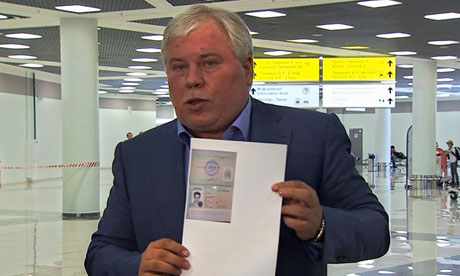By Brandon Cottrell
Impunity Watch Reporter, North America
WASHINGTON, D.C., United States – Abdulbaki Todashev, whose son Ibragim was shot to death by FBI agents, has arrived in Florida to prepare his case.

Ibragim, who was friends with Boston Marathon bombing suspect Tamerlan Tsarnaev, voluntarily submitted to FBI questioning this past May. The interrogation was based on Ibragim and Tsarnaev’s potential ties to a triple homicide in Massachusetts in 2011. During the course of this interrogation, FBI agents shot Ibragim. The circumstances that lead to the shooting remain uncertain as the agents gave conflicting narratives.
Some agents claim they were forced to shoot Ibragim in self-defense because Ibragim lunged at them with a knife; but others say Ibragim was armed only with a broomstick. Still other agents maintain Ibragim was entirely unarmed throughout the confrontation. Abdulbaki, meanwhile, claims that Ibragim did not pose a threat to the agents, as he was weakened by a recent knee surgery and was on crutches.
The FBI has yet to issue a clarifying statement as to what actually transpired during the interrogation and it is unlikely that such a statement will ever be released. The FBI, however, along with the US Department of Justice, launched investigations into the confrontation to determine whether the use of deadly force was reasonable.
The Florida Council on American-Islamic Relations hired a homicide investigator and claims Ibragim was shot seven times. The investigator’s report claims Ibragim was shot in the back of the head while he was lying on the ground. However, because the FBI will not release the official autopsy report, the investigator’s claims cannot be confirmed.
The Florida Council on American-Islamic Relations also claims that the FBI, while questioning Ibragim’s friends, “illegally threatened to throw them in jail and take away their green cards if they did not become informants and spy on several members of their faith, their mosques, their restaurants and so on.”
Abdulbaki cannot afford a lawyer and speaks minimal English. Therefore, the American Civil Liberties Union of Florida promised to aid in the investigation. Howard Simon, director of the ACLU says the lack of answers is disappointing, and that, “Secrecy fosters suspicion and the people of Florida deserve better than to be left without an explanation from their government about what led to a person being shot to death.”
Abdulbaki will hold at press conference Tuesday at the Florida Council on American-Islamic Relations office, where he plans to update the public on newly discovered information as well as the status of his lawsuit.
For further information, please see:
Chicago Tribune – Father of Chechen man shot by FBI after Boston bombings in U.S. to probe killing – 7 August 2013
Orlando Sentinel – Father of Chechen man shot during FBI interrogation to speak out in Florida – 7 August 2013
Russia Today – Killed Chechen’s father arrives in US to sue the FBI – 6 August 2013
Washington Times – Ibragim Todashev’s father to sue FBI; Tsarnaev’s friend was shot in Florida – 6 August 2013
The Guardian – Florida won’t investigate Ibragim Todashev shooting – 31 July 2013



